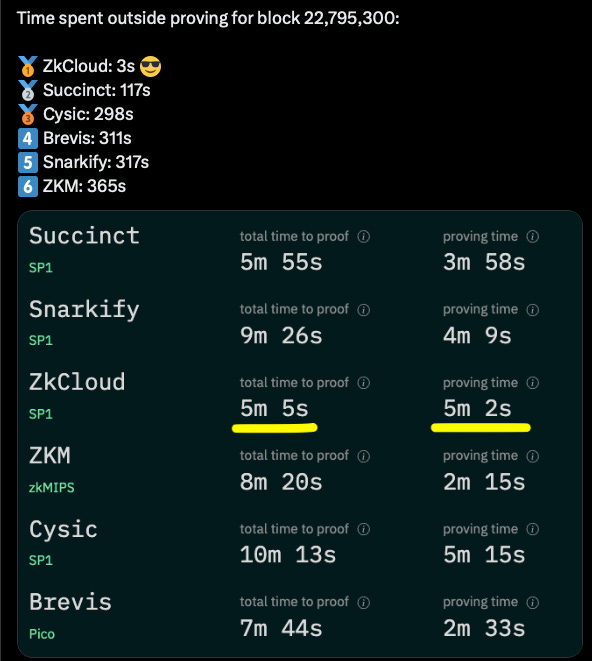Equilibrium Infra Bulletin #54: ZkCloud Reduces Pre-Proving Times By 1,000x, Google Open-Sources ZK-library, and more...
Equilibrium designs, builds, and invests in core infrastructure for the decentralized web. We are a global team of ~30 people who tackle challenges around security, privacy, and scaling.
🔍 ZkCloud Reduces Total End-to-End Proving Time By Optimizing Pre-Proving Phase
⚡️ Topic Summary
Ethereum block-proving has been a hot topic lately, with an increasing number of teams achieving real-time proving (proving Ethereum blocks in less than 12s). The latest one to join the real-time proving club is Zisk (recently spun out from Polygon).
However, the whole end-to-end proving process includes additional steps beyond just generating the proving trace. One crucial element, which has been a bottleneck for total proving time, is fetching Ethereum block data to feed into the zkVMs.
This process used to take minutes, but the ZkCloud team recently managed to reduce it by 1,000x - from hundreds of seconds to hundreds of milliseconds. The main trick is around a custom fetcher using Reth's debug_executionWitness and building the MPT from that. It will be open-sourced soon.

Source: Eth Proofs
🤔 Our Thoughts
As recently as a year ago, many industry participants considered real-time proving for Ethereum blocks as a mere pipe dream. Yet, today we have multiple zkVM teams that have managed to prove a majority of Ethereum blocks within the 12s boundary. This is a testament to the incredible engineering and innovation of these teams.
While there is still a lot of work to further lower proving latency, the focus is now shifting towards cost, stability, and security:
Cost: The teams that have achieved real-time proving have used large clusters of high-end GPUs (ranging from 50-200 GPUs). This is a significant amount of compute dedicated to a single use case and would be expensive to run in production. EthProofs is already doing a great job by providing standardised benchmarks for proving, while upcoming upgrades for several zkVMs are expected to drastically reduce the amount of GPUs needed. ZK is getting faster and cheaper.
Stability: Proving 95% of the blocks (or even 99%) is not enough, if there is a minority of blocks that can halt the prover and block production (once proving is enshrined). Focusing on worst-case scenarios takes into account certain opcodes and transaction types that are exceptionally costly and time-consuming to prove. Improving performance here makes it more feasible to integrate proving into critical, production-grade workstreams.
Security: As zkVMs (and ZKPs more generally) become a more integral part of our systems and we rely on them to verify integrity, security becomes even more paramount. Bugs in proving systems and zkVMs can enable false positives or negatives, which could be catastrophic (particularly if there is no backup system for verification). Security measures such as auditing, formal verification, and fallback mechanisms are likely to become more commonplace as ZK systems gain more widespread adoption.
Parting Thought: If the end-goal is to prove all execution on Ethereum (enshrined zkVM), when should we transition from pricing resources in gas to some measure that better captures the cost of proving (e.g. proving cycles used)? This would also help address the problem of “proving killers” - blocks that are cheap to construct (low gas usage) but filled with operations that are difficult and costly to prove.
💡 Research, Articles & Other Things of Interest
📚 Opening up ‘Zero-Knowledge Proof’ technology to promote privacy in age assurance: Google open-sources its ZKP libraries used for identity verification and the EU’s upcoming digital identity wallet. Developed in partnership with Sparkasse (the largest financial group in Europe) to support EU age assurance. Will we soon have more than 50 million bank customers leveraging ZKPs without even realizing it?
📚 Announcing the Zama Confidential Blockchain Protocol: With the recent surge in institutional interest in blockchains, privacy and confidentiality solutions are again becoming more topical. The Zama Confidential Blockchain Protocol enables confidential smart contracts on top of any L1 or L2 (starting with EVM chains).
📚 6 Use Cases for DePIN: At their core, DePIN protocols offer an alternative to the monopolistic, opaque, and outdated infrastructure systems we rely on today. Examples of industries include energy, telecom, and transport.
📚 Zisk joins the real-time club, i.e. proving Ethereum blocks in under 12s.
🤌 Personal Recommendations From Our Team
📚 Reading: The Tsar of Love and Techno - Anthony Marra: From a 1930s Soviet censor to young children growing up in Siberian mining towns - the book ties together a cast of remarkable characters whose lives intersect in surprising ways.
🎧 Listening: The Gift and The Curse of Staying Private: Bill Gurley breaks down dynamics in (traditional) VC markets and second-order effects from companies staying private for longer.
💡 Other: No way Starcloud’s putting a data centre in space in a Starship or $8.2 million: In case you wondered if launching data centers to orbit would be a good idea.


